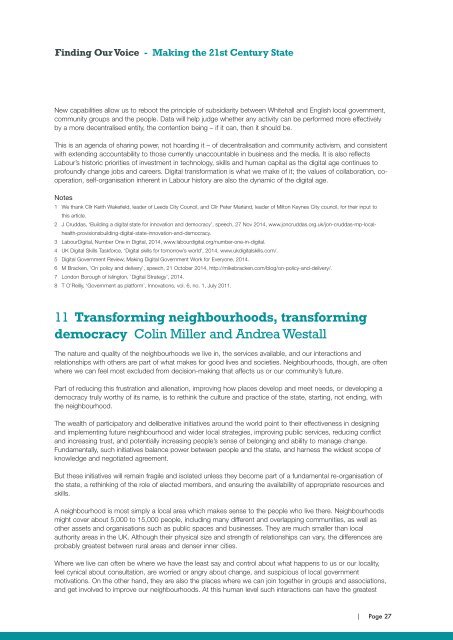Compass-Finding-Our-Voice-Final1
Compass-Finding-Our-Voice-Final1
Compass-Finding-Our-Voice-Final1
Create successful ePaper yourself
Turn your PDF publications into a flip-book with our unique Google optimized e-Paper software.
<strong>Finding</strong> <strong>Our</strong> <strong>Voice</strong> - Making the 21st Century State<br />
New capabilities allow us to reboot the principle of subsidiarity between Whitehall and English local government,<br />
community groups and the people. Data will help judge whether any activity can be performed more effectively<br />
by a more decentralised entity, the contention being – if it can, then it should be.<br />
This is an agenda of sharing power, not hoarding it – of decentralisation and community activism, and consistent<br />
with extending accountability to those currently unaccountable in business and the media. It is also reflects<br />
Labour’s historic priorities of investment in technology, skills and human capital as the digital age continues to<br />
profoundly change jobs and careers. Digital transformation is what we make of it; the values of collaboration, cooperation,<br />
self-organisation inherent in Labour history are also the dynamic of the digital age.<br />
Notes<br />
1 We thank Cllr Keith Wakefield, leader of Leeds City Council, and Cllr Peter Marland, leader of Milton Keynes City council, for their input to<br />
this article.<br />
2 J Cruddas, ‘Building a digital state for innovation and democracy’, speech, 27 Nov 2014, www.joncruddas.org.uk/jon-cruddas-mp-localhealth-provisionsbuilding-digital-state-innovation-and-democracy.<br />
3 LabourDigital, Number One in Digital, 2014, www.labourdigital.org/number-one-in-digital.<br />
4 UK Digital Skills Taskforce, ‘Digital skills for tomorrow’s world’, 2014, www.ukdigitalskills.com/.<br />
5 Digital Government Review, Making Digital Government Work for Everyone, 2014.<br />
6 M Bracken, ‘On policy and delivery’, speech, 21 October 2014, http://mikebracken.com/blog/on-policy-and-delivery/.<br />
7 London Borough of Islington, ‘Digital Strategy’, 2014.<br />
8 T O’Reilly, ‘Government as platform’, Innovations, vol. 6, no. 1, July 2011.<br />
11 Transforming neighbourhoods, transforming<br />
democracy Colin Miller and Andrea Westall<br />
The nature and quality of the neighbourhoods we live in, the services available, and our interactions and<br />
relationships with others are part of what makes for good lives and societies. Neighbourhoods, though, are often<br />
where we can feel most excluded from decision-making that affects us or our community’s future.<br />
Part of reducing this frustration and alienation, improving how places develop and meet needs, or developing a<br />
democracy truly worthy of its name, is to rethink the culture and practice of the state, starting, not ending, with<br />
the neighbourhood.<br />
The wealth of participatory and deliberative initiatives around the world point to their effectiveness in designing<br />
and implementing future neighbourhood and wider local strategies, improving public services, reducing conflict<br />
and increasing trust, and potentially increasing people’s sense of belonging and ability to manage change.<br />
Fundamentally, such initiatives balance power between people and the state, and harness the widest scope of<br />
knowledge and negotiated agreement.<br />
But these initiatives will remain fragile and isolated unless they become part of a fundamental re-organisation of<br />
the state, a rethinking of the role of elected members, and ensuring the availability of appropriate resources and<br />
skills.<br />
A neighbourhood is most simply a local area which makes sense to the people who live there. Neighbourhoods<br />
might cover about 5,000 to 15,000 people, including many different and overlapping communities, as well as<br />
other assets and organisations such as public spaces and businesses. They are much smaller than local<br />
authority areas in the UK. Although their physical size and strength of relationships can vary, the differences are<br />
probably greatest between rural areas and denser inner cities.<br />
Where we live can often be where we have the least say and control about what happens to us or our locality,<br />
feel cynical about consultation, are worried or angry about change, and suspicious of local government<br />
motivations. On the other hand, they are also the places where we can join together in groups and associations,<br />
and get involved to improve our neighbourhoods. At this human level such interactions can have the greatest<br />
| Page 27


